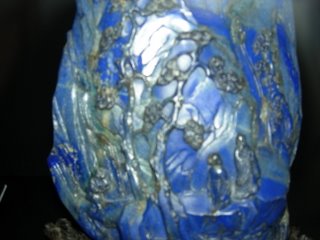
Lapis Lazuli*
(for Harry Clifton)
I have heard that hysterical women say
They are sick of the palette and fiddle-bow.
Of poets that are always gay,
For everybody knows or else should know
That if nothing drastic is done
Aeroplane and Zeppelin will come out.
Pitch like King Billy** bomb-balls in
Until the town lie beaten flat.
All perform their tragic play,
There struts Hamlet, there is Lear,
That's Ophelia, that Cordelia;
Yet they, should the last scene be there,
The great stage curtain about to drop,
If worthy their prominent part in the play,
Do not break up their lines to weep.
They know that Hamlet and Lear are gay;
Gaiety transfiguring all that dread.
All men have aimed at, found and lost;
Black out; Heaven blazing into the head:
Tragedy wrought to its uttermost.
Though Hamlet rambles and Lear rages,
And all the drop-scenes drop at once
Upon a hundred thousand stages,
It cannot grow by an inch or an ounce.
On their own feet they came, or On shipboard,'
Camel-back; horse-back, ass-back, mule-back,
Old civilisations put to the sword.
Then they and their wisdom went to rack:
No handiwork of Callimachus,***
Who handled marble as if it were bronze,
Made draperies that seemed to rise
When sea-wind swept the corner, stands;
His long lamp-chimney shaped like the stem
Of a slender palm, stood but a day;
All things fall and are built again,
And those that build them again are gay.
Two Chinamen, behind them a third,
Are carved in lapis lazuli,
Over them flies a long-legged bird,
A symbol of longevity;
The third, doubtless a serving-man,
Carries a musical instrument.
Every discoloration of the stone,
Every accidental crack or dent,
Seems a water-course or an avalanche,
Or lofty slope where it still snows
Though doubtless plum or cherry-branch
Sweetens the little half-way house
Those Chinamen climb towards, and I
Delight to imagine them seated there;
There, on the mountain and the sky,
On all the tragic scene they stare.
One asks for mournful melodies;
Accomplished fingers begin to play.
Their eyes mid many wrinkles, their eyes,
Their ancient, glittering eyes, are gay.
*A deep-blue semiprecious stone. In a letter dated July 6, 1935, Yeats wrote, "Someone [i.e., the English writer Harry Clifton] has sent me a present of a great piece [of lapis lazuli] carved by some Chinese sculptor into the semblance of a mountain with temple, trees, paths, and an ascetic and pupil about to climb the mountain. Ascetic, pupil, hard stone, eternal theme of the sensual east. The heroic cry in the midst of despair. By no, I am wrong, the east has its solutions always and therefore knows nothing of tragedy. It is we, not the east, that must raise the heroic cry."
**At the Battle of the Boyne on July 1690, William III, king of England since 1689, had defeated the forces of the deposed king, James II.
*** Greek sculptor of the fifth centure B.C.E. In A Vision, Yeats says that only one example of his work remains, a marble chair, and goes on to mention "that bronze lamp shaped like a palm, known to us by a description in Pausanias."
William Butler Yeats 1936
You could write a teriffic paper on "Lapis Lazuli" and aesthetics. In case you haven't noticed over some of my last PotWs, I have become very interested in aesthetics (art theory - what is art, what is beauty, what can they do, how do we define them - also (in my opinion) a branch of philosophy devised for people who want to make talking about art official. Though isn't that what this blog is?). I became very interested in this Yeats poem for an entirely different reason, though. The National Library in Dublin has an exhibit running with a huge collection of Yeats' manuscripts and possessions, including the fantastic piece of lapis he writes about in this poem. I have put the picture I took of it up in the posting just below this one, in case you are curious.
The poem itself is long and difficult - I am so worked up from finishing it that we'll see how far I get through this PotW close read itself. As with all of the poems, I recommend reading this one out loud - the rhythm is rumbling and controlled, and the language is so interesting that it's easy to not pay attention to what the poem's saying. With this one, I went through the three stages of comprehension very apparently - the first read was an acceptance of the words, getting a feeling of what was there, then the subsequent three or four reads were much slower and denser, but it hangs together in the final read. The poem is so difficult because there are many gaps and contradictions. Yeats makes it hard to follow the conception of art. In this close read, I will try to direct you to the keystone words that help the poem fall into place.
However, it's bedtime in Ireland, so I hope that you will all bear with the rather thin PotWs of late... that's traveling and finals for you. I hope you are all well, and feel free to email me at any time. love and love
I didn't mean it to be so blurry, but it is hard to see on the little camera screen. It is a big chunk of lapis - about 10 in. tall, I would guess.